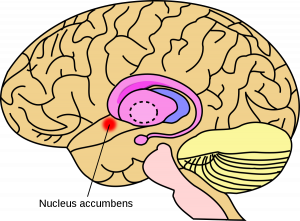While there are inevitably reasons why people enjoy listening to music, many of these reasons can be attributed to changes in the brain, giving off a reward signal that leads to the pleasurable feelings associated with music. Music’s impact on the brain is a relatively new area of research, so there are still many, many unanswered questions. However, research over the last couple of decades have given us more information than ever before on the neurochemistry of music. The four areas on which to focus are 1) reward, motivation, and pleasure, 2) stress and arousal, 3) immunity, and 4) social affiliation.
Reward, Motivation, and Pleasure
The main question regarding music’s impact on reward is whether it has the same features of another rewarding stimulus that encourages repetition of the activity to obtain the pleasurable feeling. Music is already known to have the capacity to evoke emotions in an individual, and these emotions can span across the entire spectrum: happy, sad, joy, fear, etc. While musical pleasure can be tied to the intensity of emotional arousal, music doesn’t seem to have the survival benefit or addictive properties associated with other reward-inducers, such as drugs of abuse. There is evidence, however, that music effects the same reward systems as other reinforcing stimuli, so music is surely capable of giving off a rewarding feeling.

Music has also been identified as involving activation of the nucleus accumbens (NAc), which is a brain region crucial to reward responses. This was discovered through the use of positron emission tomography (PET) and functional magnetic resonance imaging (fMRI), demonstrating that pleasure-inducing music was associated with higher blood flow (activation) to the NAc. To support the contention that music acts along the same pathways as other rewarding stimuli, fMRI was used to identify the involvement of dopaminergic reward pathways in the processing of music.
Stress and Arousal
Music has largely been thought to decrease stress levels and modulate arousal levels. Interestingly, music has also been used following a stressful operation to decrease use of painkillers in recovery. There are plenty of ways for music to be used as therapy, especially since it is known to have a notable effect on mood. Guided Imagery and Music, a specified therapy technique, was shown to reduce activation of the HPA stress axis and decrease cortisol levels, both of which are very positive responses. However, these findings do depend on the type of music, as some genres had the opposite effect. This could also mean that personality plays an important role in music’s effects, as preferred genres will likely have a more significant effect. Music is believed to initiate reflexive brainstem responses, which explains why it can affect stress levels and mood.
Immunity
Music’s role in immunity is one that has produced many questions, but also some interesting findings as to how music could be used to strengthen immune responses. It might be obvious that music can cause positive feelings, but what may not be obvious is the fact that those positive feelings can mitigate negative effects of age and stress on the body and brain. One specific experiment studied the effect of group drumming on participants and found that it caused enhanced immune functioning and a buffered stress response. What a positive finding! There are also studies that concluded that recreational music-making can counteract immune modulation normally caused by advancing age and stress levels. Essentially, there appears to be a modulatory role for music in immune regulation.
Social Affiliation

It’s clear that music creates positive feelings within those who experience it. Two possible sources of these social effects are the neuropeptides called oxytocin and vasopressin. These molecules suggest a biological basis for music’s role in the formation of social bonds. For example, a 30-minute singing lesson caused an increase in oxytocin levels. However, there are questions surrounding music’s role in social affiliation due to the findings so far not having controls required for full comparison. This is an important future pursuit.
Conclusion
While the neurochemistry of music is a relatively new area of research and discovery, it is clear that there are interesting findings yet to be discovered. Future research should consider more comparative controls, allowing for more conclusive results. Still, it means that there’s music to your ears, but also music to your brain!
For further reading, check out the paper linked here.
